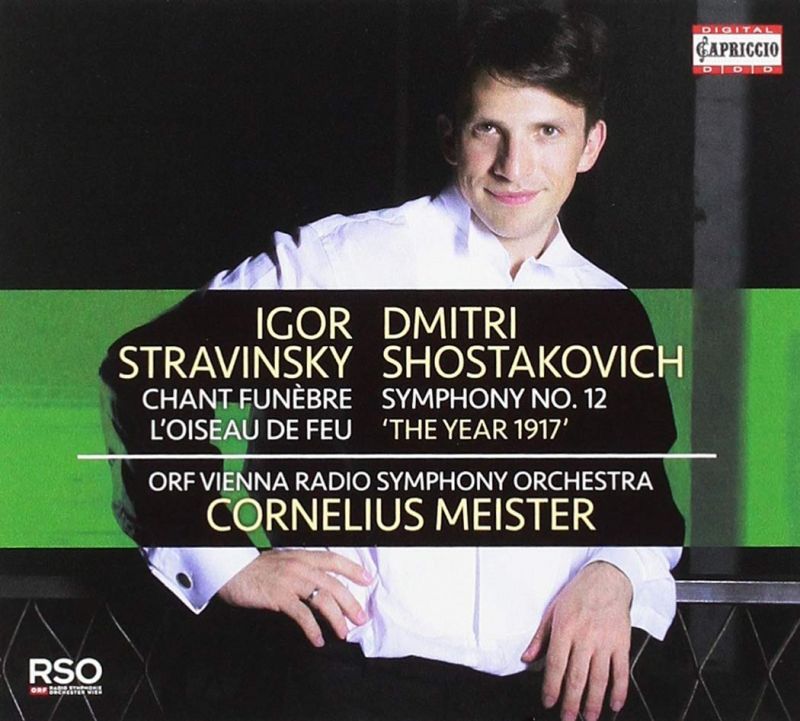SHOSTAKOVICH Symphony No 12 (Meister)
View record and artist detailsRecord and Artist Details
Composer or Director: Dmitri Shostakovich, Igor Stravinsky
Genre:
Orchestral
Label: Capriccio
Magazine Review Date: 04/2019
Media Format: CD or Download
Media Runtime: 69
Mastering:
DDD
Catalogue Number: C5352

Tracks:
| Composition | Artist Credit |
|---|---|
| Chant Funèbre (Funeral Song) |
Igor Stravinsky, Composer
Cornelius Meister, Conductor Igor Stravinsky, Composer Vienna Radio Symphony Orchestra |
| (The) Firebird Suite |
Igor Stravinsky, Composer
Cornelius Meister, Conductor Igor Stravinsky, Composer Vienna Radio Symphony Orchestra |
| Symphony No. 12, 'The Year 1917' |
Dmitri Shostakovich, Composer
Cornelius Meister, Conductor Dmitri Shostakovich, Composer Vienna Radio Symphony Orchestra |
Author: Mark Pullinger
Shostakovich was just a boy when the Revolution occurred but he witnessed violence on the streets of St Petersburg. The Twelfth has programmatic movement titles and deploys snatches of revolutionary songs, but is much less cinematic than the Eleventh (The Year 1905), with movement titles like ‘Revolutionary Petrograd’ and ‘The Dawn of Humanity’. ‘Razliv’ refers to the village where Lenin went into hiding, while ‘Aurora’ was the name of the cruiser on the River Neva from which the first shot was fired to signal the Bolshevik assault on the Winter Palace.
It’s not exactly subtle stuff and the only convincing way to treat it is to go at it hammer and tongs. The ORF VRSO has a wonderfully dark sound, particularly its lower strings, but is occasionally a bit too polite for this material. Vasily Petrenko has honed a great Russian pedigree at the Royal Liverpool Philharmonic, whose woodwinds scowl and leer far more viciously than their Viennese counterparts. Meister errs on the ponderous side, a good minute longer than Petrenko in the opening movement, two minutes longer in the second. The air of tension builds nicely in ‘Aurora’, though; and even if they don’t sound as unbuttoned as the RLPO in the finale, they still generate the required decibels, contained well in Capriccio’s weighty recording in Vienna’s Konzerthaus.
By 1917, Stravinsky had long since left Russia for the West. Two early – pre-Revolution – works join Shostakovich’s Twelfth. The recently rediscovered Chant funèbre, Stravinsky’s memorial to his teacher Rimsky-Korsakov, is given a much swifter account than Chailly’s premiere recording on Decca, the strings especially fine. There is such vivid detail in the full ballet score to The Firebird – which takes its plumage straight from Rimsky’s colouring – that any performance of the 1919 suite leaves me feeling short-changed. Meister offers a perfectly fine account but – of recent recordings – it’s that man Petrenko again who teases out the mystery and the knotty intricacies of the score better in the full ballet (Onyx, 1/19). The VRSO pack a punch in the Infernal Dance and the General Rejoicing of the finale surges well, but it’s not the most memorable account.
Discover the world's largest classical music catalogue with Presto Music.

Gramophone Digital Club
- Digital Edition
- Digital Archive
- Reviews Database
- Full website access
From £8.75 / month
Subscribe
Gramophone Full Club
- Print Edition
- Digital Edition
- Digital Archive
- Reviews Database
- Full website access
From £11.00 / month
Subscribe
If you are a library, university or other organisation that would be interested in an institutional subscription to Gramophone please click here for further information.




